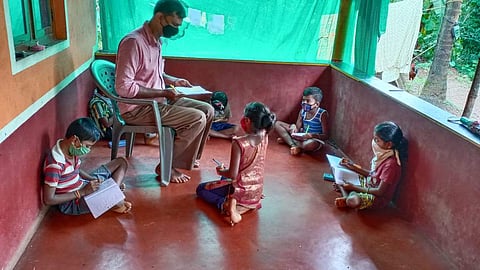

Recently, when Govinda Nayak came across the news of parents who sold their cattle to buy a television so that their kids don't miss out on their live classes, he felt bad for those poor students and their families who can't afford to buy a smartphone or television. At the same time, the Government of Karnataka had initiated a new programme called Vidyagama. Govinda, a Cluster Resource Person in the education department in Kadapa village of Puttur district in Dakshina Kannada, says, "I conducted a meeting with the teachers in our cluster and all 30 of them agreed to initiate the Vidyagama programme. It's been over a week since we initiated it. And through this initiative, 600 children in our cluster are being benefitted. Our cluster includes five primary schools, three higher primary schools, one high school which is aided and one unaided high school."
Where exactly do these offline classes take place? Govinda explains, "We have divided the teachers and their students into groups based on the area they live in so that there is enough space for them to sit whenever we host the class. In these groups, we have again divided the students into those who have access to online education and the ones who don't. The students who don't have access to a mobile, television and smartphone are given direct classes by teachers. Since we can't conduct these classes at school, we have special permission from the education department to conduct them in temples, mosques, churches, community marriage halls or houses that have a huge sit-out area. When we requested these individual house owners, they were more than happy to host us. Parents also happily sent their children to these classes as they were deprived of education. Parents themselves arranged for clean and hot drinking water, sanitisers, masks, a separate tap water facility for a hand wash area etc. Meanwhile, we ensured to allot fewer children to each class and ensure social distancing."
As midday meals are not being provided to children at this present time, the classes happen from 10 am to 12.30 pm. The teachers have paced themselves well and they have already completed the bridge courses for the kids studying from class IV to X. "We conducted pre-tests and post-tests for this bridge course and promoted children to the next academic year. Besides this, some of the teachers have already completed teaching the first chapter in a few subjects," Govinda concludes.
